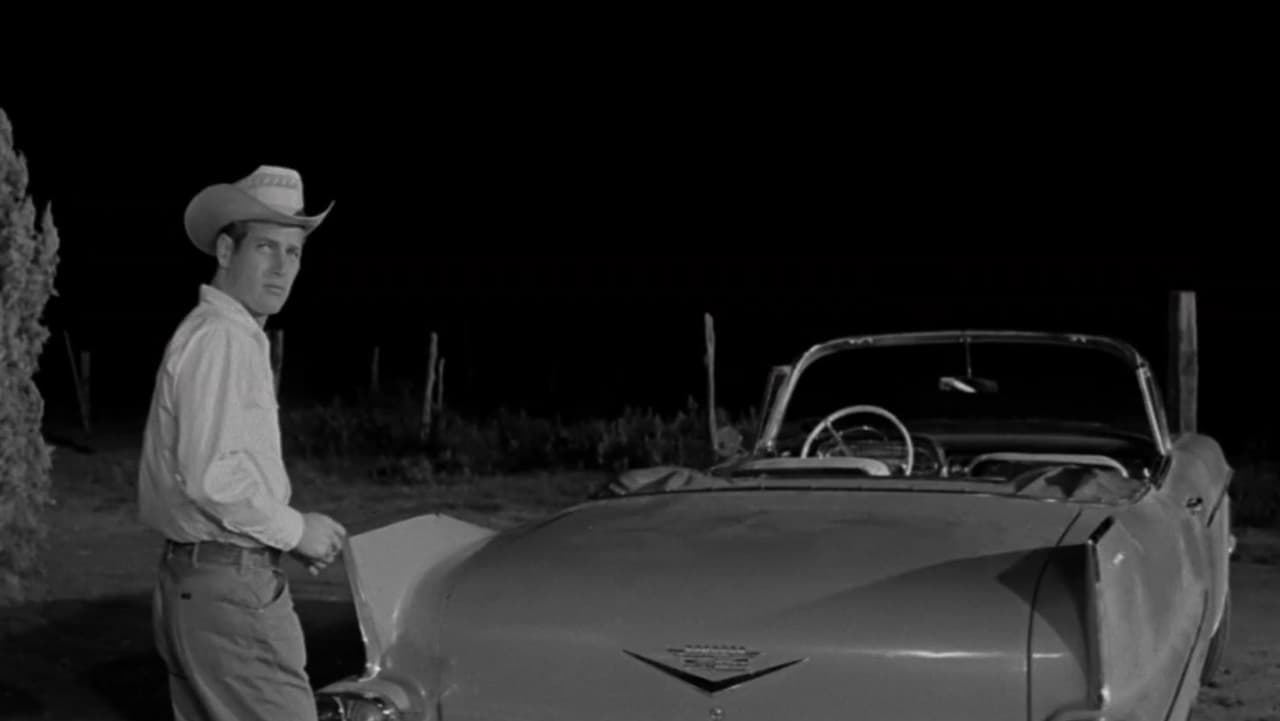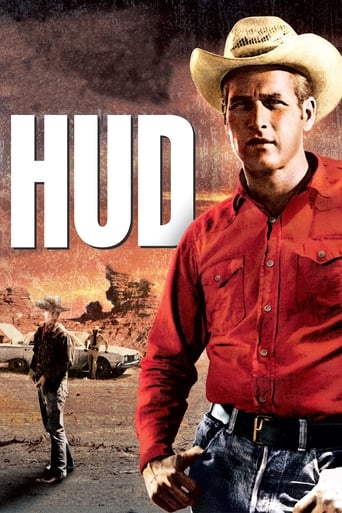

Best movie of this year hands down!
... View MoreLet's be realistic.
... View MoreIt isn't all that great, actually. Really cheesy and very predicable of how certain scenes are gonna turn play out. However, I guess that's the charm of it all, because I would consider this one of my guilty pleasures.
... View MoreA great movie, one of the best of this year. There was a bit of confusion at one point in the plot, but nothing serious.
... View MoreExcellent cinematography and performances cement 'Hud (1963)' as a well-made character piece. It has a good script, with rustically realistic dialogue compounding its sense of time and place as well as its sometimes difficult themes and situations, and it is entertaining enough to watch once but isn't really all that compelling. It's not like I was on the edge-of-my-seat but I cared enough about the characters to want to see what would happen and, indeed, to believe everything that did. The central character isn't exactly your typical 'leading man', either, and this departure allows Newman's acting chops to really come through. 6/10
... View MoreHUD is a drama film with elements of a western about an arrogant and irresponsible son of a rancher, whose life is very messy. This is a story about relationships and conflicts within a family. It is based on Larry McMurtry's 1961 novel, "Horseman, Pass By".Hud is an amoral and unemotional rancher. He, very often, comes into a conflict with his father, which has a negative impact on his young nephew. His father holds Hud responsible for the death of his other son. He tries to imbue his grandson with a sense of decency and responsibility to others. When their cattle fall ill, the conflict between father and son begins to escalate...The Texas cow country is represented through a discord in a family. It's nothing new, but a realistic approach is enriched with dose of a sick materialism and immorality, which is probably the biggest asset of this film. This is a cold review of one human mind, which rejects any kind of traditional values. Characters is placed on the scale several times, but it is clear that there is no winner. One thing is certain, this is not a conflict between traditional and modern ways of thinking.The scenery is a kind of combination between a poor ranch and cheap city. The atmosphere is grim and tense. Characterization is very good.Paul Newman as Hud Bannon is a restless, arrogant and ambitious rancher. He is a man, who has fallen into a trap of modern understanding of life around him. He, at the same time, understands and despises the people around him. Mr. Newman is a charming monster in this film.Melvyn Douglas as Homer Bannon is a traditional farmer who loves his ranch and cattle more than his own son. He is an old man who sees his own disappointment and shame in actions and behavior of his son. Mr. Douglas has offered a very touching performance.Brandon deWilde as Lonnie Bannon is a young man who is torn with relationship between his venerable grandfather and his harsh and greedy uncle. He is naive, sensitive and, perhaps, sexually depressed. Patricia Neal as Alma Brown is a lonely housewife with a broken heart and a strong dignity. Ms. Neal has almost stole this show.
... View MoreHud (1963)**** (out of 4) One of the bleakest films ever made, HUD centers on the title character played by Paul Newman who is about as ruthless as one can be. He cares for very little in this world and everything he does love is usually something bad. His father (Melvyn Douglas) has hated him for some time now but after their cattle grows sick they begin to butt heads.HUD certainly isn't a very cheerful film and it's one of the darkest and in reality sadness movies ever made. While it's not always easy to watch there's no denying its impact plus the fact that it contains three of the greatest performances that you're ever going to see. HUD works on many levels but it's strength is certainly the performances as well as its honest character study of someone most people will find cool but when you get pass all the smoke you see a rather ugly human being.The screenplay itself is extremely laid back and in fact the film is pretty quiet. There's not too much screaming or long speeches but instead there's just a very realistic tone that comes across quite natural and real. I think most people will be able to look at these main four characters and either be one of them are know someone like them. There's the young cool guy who hurts everything that he comes into contact with. There's the older wise man who stands by his morals. There's a broken house maid who is probably hiding some sadness. Then there's the young nephew who looks up to Hud not knowing or understanding his type of character.Then, there are the terrific performances, which are among the best you'll ever see. Newman never had an issue playing cool but he always made it look so easy. He brings that quality to Hud but there's also that underlying dirty and dangerous part. There's just a certainly coldness that Newman brings to the character, which we never saw from him in his other roles. Douglas rightfully won the Best Supporting Actor Oscar for his deep and very sincere performance. Neal is a great big ball of sadness and her deep eyes just say so much without her having to speak a word. Even Brandon De Wilde is very impressive in his role and especially when you consider the major talent he was acting against.HUD also features a terrific and haunting music score and the Oscar-winning cinematography perfectly captures the dusty dirt roads. The film manages to keep getting better with time as its messages are perhaps more true today than when the film was originally released.
... View MoreIn rural Texas, Hud Bannon (Paul Newman) is a self-centered amoral womanizer. He's always in conflict with his principled rancher father Homer (Melvyn Douglas). His nephew Lonnie looks up to him. The Bannon boys are attracted to housekeeper Alma (Patricia Neal) but she's been mistreated before. Homer insists on calling the government vet after a mysterious cattle death despite Hud's objections. Foot and mouth disease is suspected and the entire herd is in danger of liquidation. Hud wants to sell the herd no matter the consequences to other people.All four lead performances are amazing. Paul Newman and Melvyn Douglas are incredible. Patricia Neal is truly brilliant. It's one of the great female performances of all times. The fact that she's not the lead and still won the Oscar for lead actress says a lot. She gives a full body performance. Paul Newman is so likable that he turns the amoral character into a hero of some sort. The look is crisp black and white. It's a movie of compelling characters and terrific performances.
... View More